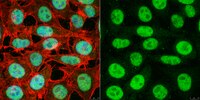Truncation of Ube3a-ATS unsilences paternal Ube3a and ameliorates behavioral defects in the Angelman syndrome mouse model.
Meng, L; Person, RE; Huang, W; Zhu, PJ; Costa-Mattioli, M; Beaudet, AL
PLoS genetics
9
e1004039
2013
Show Abstract
Angelman syndrome (AS) is a severe neurodevelopmental disorder caused by maternal deficiency of the imprinted gene UBE3A. Individuals with AS suffer from intellectual disability, speech impairment, and motor dysfunction. Currently there is no cure for the disease. Here, we evaluated the phenotypic effect of activating the silenced paternal allele of Ube3a by depleting its antisense RNA Ube3a-ATS in mice. Premature termination of Ube3a-ATS by poly(A) cassette insertion activates expression of Ube3a from the paternal chromosome, and ameliorates many disease-related symptoms in the AS mouse model, including motor coordination defects, cognitive deficit, and impaired long-term potentiation. Studies on the imprinting mechanism of Ube3a revealed a pattern of biallelic transcription initiation with suppressed elongation of paternal Ube3a, implicating transcriptional collision between sense and antisense polymerases. These studies demonstrate the feasibility and utility of unsilencing the paternal copy of Ube3a via targeting Ube3a-ATS as a treatment for Angelman syndrome. | Immunoprecipitation | 24385930
 |
An RNA interference screen identifies the Deubiquitinase STAMBPL1 as a critical regulator of human T-cell leukemia virus type 1 tax nuclear export and NF-κB activation.
Lavorgna, A; Harhaj, EW
Journal of virology
86
3357-69
2011
Show Abstract
The human T-cell leukemia virus type 1 (HTLV-1) Tax oncoprotein actively shuttles between the nucleus, where it interacts with transcriptional and splicing regulatory proteins, and the cytoplasm, where it activates NF-κB. Posttranslational modifications of Tax such as ubiquitination regulate its subcellular localization and hence its function; however, the regulation of Tax trafficking and NF-κB activation by host factors is poorly understood. By screening a deubiquitinating (DUB) enzyme small interfering RNA (siRNA) library, we identified the metalloprotease STAM-binding protein-like 1 (STAMBPL1) as a positive regulator of Tax-mediated NF-κB activation. Overexpression of wild-type STAMBPL1, but not a catalytically inactive mutant, enhanced Tax-mediated NF-κB activation, whereas silencing of STAMBPL1 with siRNA impaired Tax activation of both the canonical and noncanonical NF-κB signaling pathways. STAMBPL1 regulated Tax-induced NF-κB signaling indirectly by controlling Tax nuclear/cytoplasmic transport and was required for DNA damage-induced Tax nuclear export. Together, these results reveal that the deubiquitinase STAMBPL1 is a key regulator of Tax trafficking and function. | | 22258247
 |











